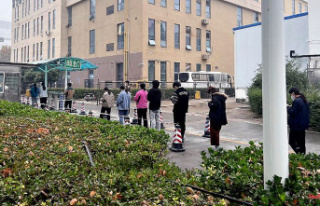For this week, the "Last Generation" announces increased disruptive actions. The preventive detention and high fines in Bavaria do not deter activists. At the beginning of the week, they slow down drivers in the Bavarian state capital as well as in the federal capital.
Activists of the "Last Generation" once again stuck themselves to a street in Berlin and Munich during a climate protest and blocked traffic. According to a police spokesman, nine people stuck to the roadway at Munich's Karlsplatz. They wore warning vests and drew attention to their demands with posters. The traffic had been diverted, but the disabilities were "moderate," it said. The group said many of the participants had already been in prison for a month and some had been sentenced to heavy fines.
In Berlin, the police first registered a protest action in front of the main train station on Invalidenstrasse with seven people. A police spokeswoman said five of them had stuck to the roadway. Further campaigns followed on Wilhelmstrasse, at the corner of Hallesches Ufer and Potsdamer Strasse, at the corner of Varian-Fry-Strasse. According to the police, four activists were stuck there. The Berlin traffic information center spoke of another protest action on the B1 in the Tiergarten area near Stresemannstraße, which caused traffic jams.
The "Last Generation" had announced further and intensified disruptive actions starting this week. In the past few weeks, activists have blocked roads, damaged works of art and paralyzed air traffic at BER Airport in Berlin. In Bavaria, some were jailed as a precautionary measure because they had announced further disturbances. Among other things, the group is demanding a speed limit of 100 kilometers per hour on motorways and a 9-euro train ticket for the whole of Germany.
From the point of view of North Rhine-Westphalia's Interior Minister Herbert Reul, the state must be very vigilant when it comes to climate activists and, after a thorough examination, may have to take a tougher approach. "The state cannot just watch and let it continue," said the CDU politician on Deutschlandfunk. The actions of the "Last Generation" are no longer about individual spontaneous deeds, but there is a nationwide tight organization. Among these activists are some left-wing extremists "who say it's about much more than that, it's about overcoming the system."
But you can't suspect everyone, said Reul. "There are a lot of people who have a normal, good concern", but who "haven't quite understood that we have rules that you have to follow". The Fridays for Future climate movement is different, its supporters have generally complied with the statutory limits. With the "last generation", on the other hand, limits have been exceeded.












